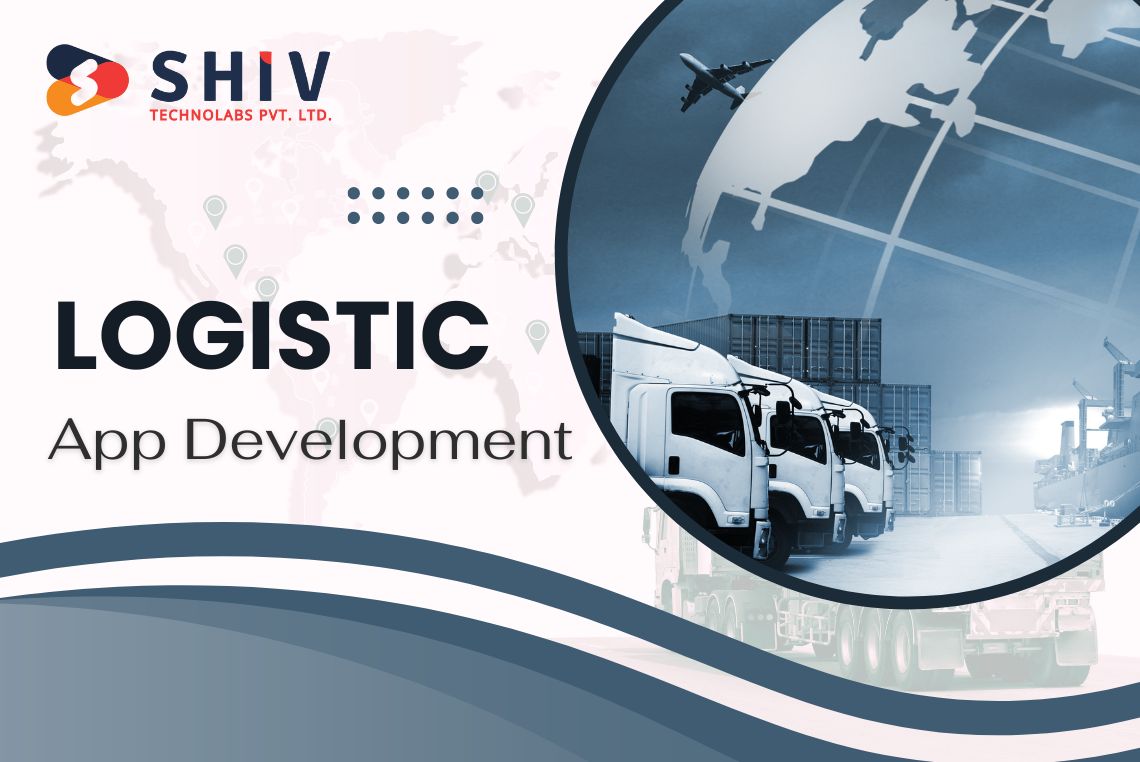Table of Contents
Logistics is the backbone of many industries, facilitating the smooth movement of goods from one place to another. As businesses expand, the need for efficient and reliable logistics solutions grows, and custom mobile app development plays a crucial role in meeting this demand. This guide will walk you through the process, cost, types, and benefits of logistics app development, providing a comprehensive understanding of what it entails.
Logistics Application: A Quick Overview

A logistics application is a digital tool designed to manage and streamline various logistics processes, including transportation, warehousing, inventory management, and more. These apps help companies improve their operations, reduce costs, and increase customer satisfaction by providing real-time tracking, efficient route planning, and seamless communication between all stakeholders.
The importance of logistics apps cannot be overstated, as they provide businesses with the agility and precision needed to stay competitive in a rapidly evolving market. Whether it’s for managing a fleet of trucks, coordinating warehouse operations, or ensuring timely deliveries, a well-designed logistics app is essential.
# Understanding the Significant Types of Logistics Applications
Logistics applications come in various forms, each tailored to address specific needs within the supply chain. Here are the most common types:
- Fleet Management Apps: These apps help in tracking and managing a fleet of vehicles. They offer features like real-time GPS tracking, fuel consumption monitoring, and maintenance scheduling.
- Warehouse Management Apps: Designed to optimize warehouse operations, these apps assist in inventory management, order processing, and space utilization.
- On-Demand Delivery Apps: These apps are used by businesses that offer delivery services, such as food delivery or courier services. They help in route optimization, order tracking, and customer communication.
- Freight Management Apps: These apps facilitate the movement of goods across long distances, often involving multiple modes of transportation. They offer features like load tracking, document management, and cost estimation.
- Supply Chain Management Apps: These comprehensive apps manage the entire supply chain, from procurement to delivery, ensuring that all processes are synchronized and efficient.
Must-Have Features for Logistics App Development
When developing a logistics app, certain features are essential to ensure its effectiveness and usability. Here are the must-have features:
- Real-Time Tracking: The ability to track vehicles, shipments, and inventory in real-time is crucial for efficient logistics management.
- Route Optimization: This feature helps in finding the most efficient routes, reducing fuel consumption and delivery time.
- Inventory Management: Keeping track of inventory levels, managing stock, and ensuring timely restocking are vital for warehouse management.
- Order Management: Efficient handling of orders, from placement to delivery, is essential for customer satisfaction.
- Notifications and Alerts: Timely notifications and alerts help in keeping all stakeholders informed about important updates, such as delays or route changes.
- Payment Integration: Secure and easy-to-use payment gateways are essential for processing transactions within the app.
- Reporting and Analytics: Detailed reports and analytics help in monitoring performance, identifying trends, and making informed decisions.
- Multi-Language Support: For businesses operating in different regions, multi-language support is crucial for smooth communication.
- User Management: Role-based access control ensures that only authorized personnel can access specific features or data.
- Customer Support Integration: Easy access to customer support helps in resolving issues quickly, enhancing the overall user experience.
Five Important Benefits of Logistics App Development

Investing in logistics app development offers several benefits that can significantly impact your business:
- Improved Efficiency: By automating processes and providing real-time data, logistics apps help in reducing manual effort, minimizing errors, and improving overall efficiency.
- Cost Reduction: Efficient route planning, fuel management, and inventory control can lead to significant cost savings.
- Enhanced Customer Satisfaction: Features like real-time tracking and timely notifications improve transparency and build trust with customers.
- Better Decision-Making: Access to detailed reports and analytics allows businesses to make informed decisions, optimizing operations and improving profitability.
- Scalability: A well-designed logistics app can easily scale to accommodate growing business needs, ensuring long-term success.
Step-by-Step Process of Logistics App Development
Developing a logistics app requires careful planning and execution. Here’s a step-by-step guide to the process:
- Requirement Analysis: Start by understanding the specific needs of your business. Identify the key features you want in your app and the problems you aim to solve.
- Market Research: Conduct thorough research to understand the market landscape, identify your competitors, and determine what makes their apps successful.
- Choose the Right Platform: Decide whether you want to develop the app for Android, iOS, or both. This decision will depend on your target audience and budget.
- Design the User Interface (UI): A user-friendly interface is crucial for the success of your app. Work with designers to create an intuitive and visually appealing UI.
- Develop the Backend: The backend is the backbone of your app, handling all the data processing, storage, and communication with the frontend. Choose a robust tech stack that can handle your app’s requirements.
- Integrate Features: Implement the essential features identified during the requirement analysis phase. This may include real-time tracking, route optimization, payment integration, and more.
- Testing: Thoroughly test the app to identify and fix any bugs or issues. Testing should cover all aspects, including functionality, performance, and security.
- Deployment: Once the app is tested and ready, deploy it to the app stores. Ensure that you have a plan for regular updates and maintenance.
- Post-Launch Support: After the app is launched, monitor its performance and gather user feedback. Use this information to make improvements and ensure the app remains relevant and effective.
Common Challenges While Developing Logistics App
Developing a logistics app is not without its challenges. Here are some common hurdles you may encounter:
- Data Security: Protecting sensitive data, such as customer information and financial details, is crucial. Implement robust security measures to prevent breaches.
- Scalability Issues: As your business grows, your app needs to handle an increasing number of users and data. Planning for scalability from the start is essential.
- Integration with Existing Systems: Integrating the app with your existing logistics systems can be complex and may require custom solutions.
- User Adoption: Ensuring that your employees and customers are comfortable using the app is vital for its success. Provide training and support to facilitate adoption.
- Regulatory Compliance: Depending on your region, there may be specific regulations governing the use of logistics apps. Make sure your app complies with all relevant laws.
# Tech Stack We Use for Logistics App Development
Choosing the right technology stack is crucial for the success of your logistics app. At Shiv Technolabs, we use a combination of modern and reliable technologies to build robust and scalable apps. Our typical tech stack includes:
- Frontend: React Native, Flutter, or Swift for iOS and Kotlin for Android.
- Backend: Node.js, Python, or Java, depending on the specific requirements of the app.
- Database: MongoDB, MySQL, or PostgreSQL for data storage.
- Cloud Services: AWS, Google Cloud, or Azure for hosting and cloud-based services.
- APIs: RESTful or GraphQL APIs for communication between the frontend and backend.
- DevOps: Docker, Kubernetes, and Jenkins for continuous integration and deployment.
This tech stack ensures that your logistics app is fast, reliable, and capable of handling large volumes of data.
# Logistics Application Development Trends to Keep an Eye On
The logistics industry is constantly evolving, and staying ahead of the latest trends is essential for success. Here are some trends to watch:
- AI and Machine Learning: AI-driven solutions for route optimization, demand forecasting, and inventory management are becoming increasingly popular.
- Blockchain Technology: Blockchain offers enhanced transparency and security in supply chain management, making it an emerging trend in logistics.
- IoT Integration: The Internet of Things (IoT) enables real-time tracking of goods, vehicles, and inventory, providing valuable insights for logistics management.
- Autonomous Vehicles and Drones: The use of autonomous vehicles and drones for delivery is on the rise, offering faster and more efficient logistics solutions.
- Sustainability: Eco-friendly logistics solutions, such as electric vehicles and optimized route planning, are gaining traction as businesses strive to reduce their carbon footprint.
How Much Does It Cost to Build a Logistics App?
The cost of developing a logistics app varies depending on several factors, including the complexity of the app, the features you want to include, and the platform you choose. Here’s a breakdown of the key cost components:
- Design: Creating a user-friendly and visually appealing design can cost anywhere from $5,000 to $20,000, depending on the complexity.
- Development: The development cost is typically the largest expense and can range from $30,000 to $200,000, depending on the app’s features and functionality.
- Testing: Thorough testing is essential to ensure the app functions smoothly, which can cost between $1,500 and $15,000.
- Deployment: Deploying the app to the app stores and setting up the necessary infrastructure can cost around $5,000 to $7,000.
- Maintenance and Updates: Ongoing maintenance and updates are crucial for keeping the app relevant and secure. This can cost between $10,000 and $50,000 per year.
In total, the cost of developing a logistics app can range from $50,000 to $250,000 or more, depending on the app’s complexity, features, and the development team you choose. It’s essential to work with a reputable logistics app developer who can provide a detailed estimate based on your specific requirements.
Shiv Technolabs: Your Logistics App Development Partner
At Shiv Technolabs, we specialize in providing comprehensive logistics app development solutions tailored to meet the unique needs of your business. Our experienced team of developers, designers, and project managers work closely with you to create a custom mobile app that streamlines your logistics operations, improves efficiency, and drives growth.
As a leading mobile app development company in Singapore, We understand the challenges involved in logistics app development and are equipped to handle everything from initial planning and design to development, testing, and post-launch support. Our commitment to quality and customer satisfaction ensures that you receive a robust, scalable, and user-friendly logistics app that delivers real value to your business.
Whether you’re looking to develop a fleet management app, a warehouse management system, or an on-demand delivery app, Shiv Technolabs has the expertise to bring your vision to life. Contact us today to know more about our logistics app development services and how we can help you achieve your business goals.



















